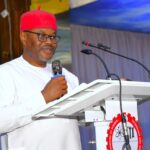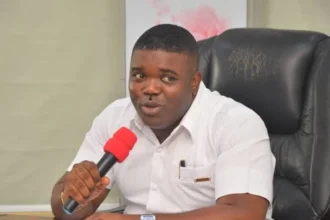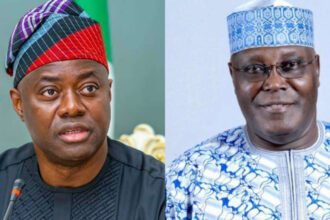
The House of Representatives has vehemently rejected a bill before the United States Congress that accuses Nigerian government officials of facilitating the persecution and mass killing of Christians. Lawmakers in the green chamber described the U.S. proposal as “misleading, uninformed, and damaging to Nigeria’s sovereignty,” insisting that there is no state-sponsored persecution of any religious group in the country.
During plenary on Wednesday, the House adopted a motion jointly sponsored by Deputy Speaker Benjamin Kalu and 359 other members, urging the federal government to respond firmly to what they termed an “unfounded and injurious” foreign legislative move. The lawmakers warned that the bill, if passed into law in the United States, could strain diplomatic relations, distort Nigeria’s global image, and embolden terrorist groups by misrepresenting the country’s internal security challenges.
The controversial legislation, titled “Nigeria Religious Freedom Accountability Act of 2025,” was introduced in the U.S. Senate by Republican lawmaker Ted Cruz. The proposed law seeks to impose targeted sanctions on Nigerian government officials allegedly complicit in religious persecution, citing claims that the Nigerian state enforces Sharia and blasphemy laws against Christians. It also urges the U.S. Secretary of State to redesignate Nigeria as a “country of particular concern” under international religious freedom standards — a move that could affect Nigeria’s diplomatic and economic relations with Washington.
The bill further recommends that extremist groups such as Boko Haram and the Islamic State in West Africa Province (ISWAP) remain on the U.S. list of “entities of particular concern,” arguing that Christians in parts of Nigeria face systemic attacks with inadequate protection from the state.
However, Nigerian lawmakers dismissed these claims as inaccurate and unfair. Leading the debate, Deputy Speaker Kalu said the U.S. bill and the accompanying recommendations by the U.S. Commission on International Religious Freedom (USCIRF) do not reflect the complex realities of Nigeria’s security environment.
“Nigeria’s constitution guarantees freedom of thought, conscience, and religion,” Kalu asserted. “Successive administrations, faith leaders, civil society organizations, and security agencies have made consistent efforts to protect worshippers of all faiths and prosecute offenders, regardless of their religious identity.”
He noted that while attacks on religious communities have occurred, they are often linked to broader security challenges — including terrorism, banditry, farmer-herder clashes, separatist agitations, and communal violence — which affect Nigerians across ethnic and religious lines.
“The attempt to isolate these incidents as targeted persecution against one religion is a distortion of facts,” Kalu warned. “External legislative actions based on incomplete or decontextualized assessments risk undermining Nigeria’s sovereignty, misrepresenting our security realities, and straining strategic relations between both nations. Such actions may also unintentionally embolden violent non-state actors who exploit religious narratives to justify their crimes.”
Contributing to the debate, House Majority Leader Julius Ihonvbere described the U.S. bill as a “dangerous overreach” by American lawmakers. He noted that the legislation has already passed its second reading in the U.S. Senate, which makes it critical for Nigeria to respond diplomatically and assertively.
“The passage of this bill would deal a serious blow to Nigeria’s international standing,” Ihonvbere cautioned. “It could portray our nation as a state that promotes religious intolerance, which is false. The reality is that Nigerians are facing economic and security challenges — not religious persecution. This is a deliberate attempt to undermine Nigeria’s democratic progress and international credibility.”
Also contributing, Hon. Oluwole Oke, Chairman of the House Committee on Foreign Affairs, criticized the U.S. Senate for excluding Nigerian diplomats, religious leaders, and government representatives from the public hearing on the bill. He described the omission as “a calculated attempt to damage Nigeria’s image before the international community.”
“It is concerning that such a serious matter was discussed without giving Nigeria an opportunity to present facts or defend itself,” Oke said. “This approach violates the spirit of mutual respect that should define relations between sovereign nations.”
Hon. Billy Osawaru, representing Edo State, said the development reflects the geopolitical dynamics of international relations. “This is global politics at play,” he remarked. “Unfortunately, Nigeria currently has no ambassador in Washington, D.C., which has limited our diplomatic engagement and left the country vulnerable to misrepresentation.”
He urged the federal government to expedite the appointment of an ambassador to the United States and strengthen Nigeria’s diplomatic and public relations apparatus to counter negative narratives abroad.
After exhaustive debate, the House resolved to formally reject the U.S. bill and its underlying allegations. Lawmakers maintained that Nigeria remains a secular nation committed to protecting freedom of religion and belief as enshrined in Section 38 of the 1999 Constitution.
“The House of Representatives rejects any narrative that frames Nigeria’s security challenges as a religious conflict or as state-sponsored persecution,” the resolution stated. “We reaffirm Nigeria’s commitment to upholding constitutional freedoms, promoting interfaith harmony, and protecting every citizen irrespective of creed or ethnicity.”
The parliament also called on the Federal Ministry of Foreign Affairs and the Nigerian Embassy in Washington, D.C., to lodge a formal complaint with the United Nations and to engage directly with U.S. lawmakers to present accurate information on Nigeria’s religious and security realities.
In addition, the House urged the U.S. Congress to consider a joint Nigeria–U.S. fact-finding and dialogue mission to review the situation on the ground and promote mutual understanding rather than confrontation.
To ensure follow-up action, the House mandated its Committee on Legislative Compliance to monitor implementation of the resolutions and report back within 28 days.
Analysts note that Wednesday’s resolution underscores Nigeria’s growing frustration with what officials see as unfair external judgments about its internal affairs, particularly concerning human rights and religious freedom. Over the years, Nigeria has repeatedly protested its inclusion on or removal from the U.S. religious freedom watch list, arguing that such designations are politically motivated and fail to reflect the country’s multi-religious coexistence.
Meanwhile, religious leaders across the country have also weighed in on the matter. Many Christian and Muslim clerics alike have consistently called for accurate representation of Nigeria’s realities, stressing that while violence affects all communities, the state itself does not discriminate against any faith group.
As Nigeria continues to grapple with insecurity, economic challenges, and efforts to rebuild national unity, the House’s resolution signals a determination to defend the nation’s sovereignty and image on the global stage.
In rejecting the U.S. bill, lawmakers reaffirmed a message of unity and constitutional equality — one that insists that Nigeria’s challenges are rooted not in religion, but in governance, development, and the ongoing struggle for peace and justice across its diverse society.






